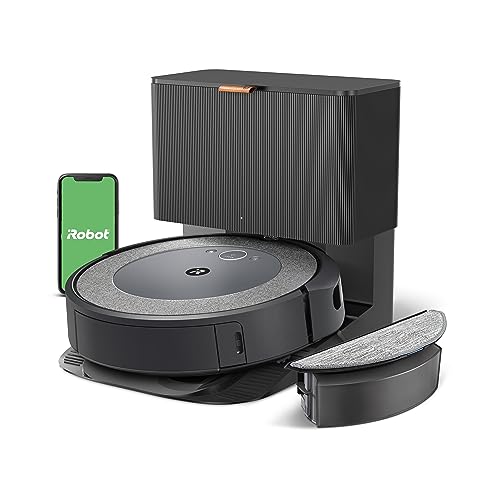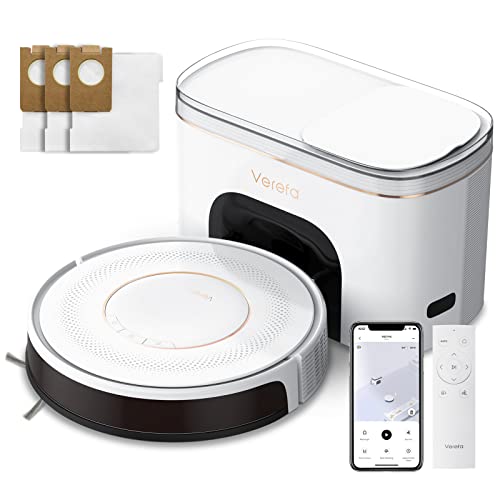10 Instagram Accounts On Pinterest To Follow About Self Emptying Vacuu…
페이지 정보
작성자 Deon 작성일24-06-04 12:16 조회778회 댓글0건관련링크
본문
 What Is a self emptying robot vacuum For hardwood floors-Emptying Robot Vacuum?
What Is a self emptying robot vacuum For hardwood floors-Emptying Robot Vacuum? Many robot vacuums have an integrated dust bin that has to be empty manually after each cleaning cycle. Self-emptying bases are an excellent feature that adds extra value to the robotic cleaner.
Many robot vacuums have an integrated dust bin that has to be empty manually after each cleaning cycle. Self-emptying bases are an excellent feature that adds extra value to the robotic cleaner.But are they worth a recurring cost? This review examines the Shark EZ robotic vacuum and its self-emptying base.
What is a self-emptying vacuum?
Self-emptying robot vacuums are cleaners with an internal storage system. It usually takes the form of a small, compact dustbin which automatically emptys itself when it is full. This eliminates the need to empty the bin manually after every cleaning session and also reduces the amount of time that you have to spend on maintenance. You can tell the time when the bin is full using an open window. These features are available on models by iRobot Ecovacs and Shark.
This technology is relatively recent and is a feature that is present on a variety of robot vacuums. Some models are less expensive than you would expect, given their advanced capabilities. Shark RV912S EZ Robot Vacuum, for example, is one of the best-rated self-emptying robot vacuums you could buy under $400.
Most robot vacuums have dustbins that get full after a couple of cleaning cycles and require manual emptying prior to the next clean-up. This can be a long process, especially in households where allergens and pet hair build up quickly. In addition, emptying a robotic vacuum can be messy as you may need to get your hands on the dirty contents or risk releasing irritants back into the air.
The self-emptying system solves both of these issues by permitting the robot to automatically transfer dirt and other debris from its dustbin into an additional enclosed storage area. It's usually a canister or bag that is inside the base station that's easily accessible and can be empty when required. They can also be used to filter dust particles, capturing them and proving beneficial to allergy sufferers.
The self-emptying system also has the benefit of being quieter than most robot vacuums, despite emptying their containers. The transfer of debris can be quite loud. This is not an issue for the majority of people but could be alarming for pets and small children.
The best robot vacuum for pet hair self emptying self-emptying robotic vacuum cleaners have many other useful features, like Wi-Fi connectivity as well as smart home integration, so you can control it via your phone or any other device that is connected, setting or automating timers, a mapping feature mop/vacuum switch option and more.
How does an automatic vacuum cleaner function?
A typical robot vacuum comes with an internal storage system. This is usually smaller than a dust bin. Depending on the size of your home and how filthy your floor is, it must be cleaned frequently. Adding a self-emptying feature to the robot vacuum can eliminate this issue by automatically returning to its base to empty the onboard dust bin into a separate dustbin. This is also referred to as Clean Base Dirt disposal (iRobot), Auto Empty Stations (Ecovacs), or Self-Emptying Bases (Shark).
Many models of robot vacuums with this feature are also fitted with a separate dock that can be used for mopping, meaning the machine can be used to serve two purposes at home. Some models have different ways of mopping and vacuuming to allow you to choose the style of cleaning you prefer.
It's important to keep in mind that while these features can be useful, they cost a lot to the robot vacuum, so they're not for everyone. These features may also add additional steps to the process of using and setting up an automated vacuum, which may be off-putting for some consumers.
The Shark RV912S EZ Robot Vacuum is an example of a self-emptying model that's quite affordable, especially when compared to standard robot vacuums. This unit has powerful suction and 3D light scanning. It can also recognize objects precisely. The large base can hold up to 60 days' worth of debris, and it will automatically returns to its charging dock to empty itself when it's fully stuffed.
It's not immediately obvious how loud a robot which is able to empty itself can be. The power of the device can be controlled by some settings however, the process of emptying the container could take as long as just a few minutes, and can be quite loud. Some people find this sound to be a disadvantage of these devices.
How often does a self-emptying air purifier need to be emptied?
Like regular robot vacuums, self-emptying models sweep your floors for hair, dust and crumbs before returning to their base to charge. In contrast to regular robots, many self cleaning models have docking stations that serve as disposal units that automatically empty the robotic cleaner's dustbin into a bigger storage bin when it's full. This means you don't have to deal with manually emptying the half-liter container after each use, and you're less likely to overfill it and creating a clog.
The docking system on certain self-emptying robots may hold dirt for up to 60 days before it needs to be removed. This means they have to be emptied less often than regular robots. It is important to keep in mind that the process of transfer is loud and could wake the pets or other people around and so this feature might not be ideal for households with a sensitive ear.
It is still recommended to regularly empty the robot's trash bin and clean its filter to prevent blockages, which can affect its performance. And you should also check the power button on the robot to ensure that it's connected and charged prior to each use.
Are self-emptying vacuums worth the expense?
Many robot vacuums are equipped with self-emptying dustbins that eliminate the requirement to empty the bin manually after each cleaning session. These devices are more expensive than traditional robot vacuums, but they help you save time and energy by not having to empty your robot's dustbin after every sweeping.
Although a self-emptying vacuum may appear to be a luxury, it can be a worthwhile investment for those who have a busy house or have pets who shed. It is also a good idea to think about it if you have chronic allergies or live in a smoky area.
Self-emptying vacuums operate by docking them with a larger basestation that has an hose to pull the debris out of the robot's dustbin and into the larger receptacle. This stops the dustbin from overflowing, or becoming blocked, making the vacuum lose suction or Self Emptying robot vacuum for hardwood floors smell. It is normal to empty your bin every 30 or 60 days based on how often you use the device.
Most self-emptying robot vacuums can connect to Wi-Fi. This makes it easy to control them with a smartphone. Many of them are compatible with Amazon Alexa or Google Home. This lets you control them with voice commands. This is especially useful if you're on a schedule or have a hectic household which makes it easier to keep your home tidy even when you're busy.
Most self-emptying robotic vacuums have a powerful vacuum motor that can easily pick up pet fur, dust, crumbs and other debris on hardwood floors and carpets with a low pile. They can also be programmed to automatically vacuum and mop on an established schedule, which can make your life much simpler.
If you're seeking a self-emptying robot vacuum that also does excellent job at mapping, creating virtual boundaries, and detecting obstacles you should consider the iRobot j7+. This powerful robot vacuum is among the top models in its class and won't be disappointed. Shark IQ XL offers many of these features for less cost.
댓글목록
등록된 댓글이 없습니다.



